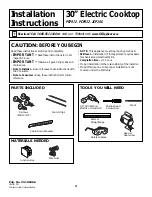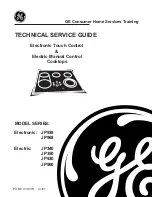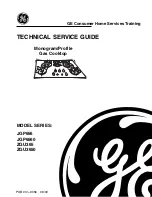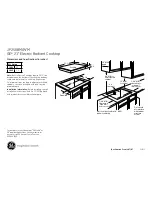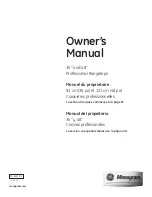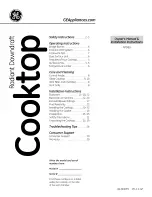
Heating withinner (small)
element only
Heating with both
elements
Fig. 1
Fig. 2
To Operate Dual Radiant Surface Elements
(some models)
Symbols on the backguard are used to indicate which coil of the Dual Radiant
element will heat. The
symbol indicates the inner coil only. The
symbol
indicates both inner and outer coils will heat (See Figs. 1 & 2 and
Suggested
Radiant Surface Element Settings Table
on previous page). You may switch
from either coil setting at any time during cooking.
Push in and turn the control
knob in either direction to the desired setting as instructed above.
Note: Areas
that heat are shown in black.
9
Radiant surface elements may appear to have cooled after they
have been turned off.
The glass surface may still be hot
and burns may occur
if the glass surface is touched before it has cooled sufficiently.
Do not place plastic items such as salt and pepper shakers,
spoon holders or plastic wrappings on top of the range when it is in use.
These items could melt or ignite. Potholders, towels or wooden spoons could
catch fire if placed too close to the surface elements.
Do not allow aluminum foil, or ANY material that can melt
to make contact with the ceramic glass cooktop.
If these items melt on the
cooktop they will damage the ceramic cooktop.
Setting the Warming Zone
(some models)
The purpose of the Warming Zone is to
keep hot cooked foods at serving temperature.
Always start with hot food. It is not
recommended to heat cold food on the Warming Zone.
All food placed on the Warming Zone should be covered with a lid or aluminum foil to maintain quality. For best results, when
warming pastries or breads, the cover should have an opening to allow moisture to escape.
Do not use plastic wrap to cover
food. Plastic may melt onto the surface and be very difficult to clean.
Use only dishware, utensils and cookware recommended for oven and cooktop use on the Warming Zone.
Note: Use the Warming Zone to keep cooked foods hot such as; vegetables, gravies, casseroles, soups, stews, breads,
pastries and oven-safe dinner plates.
Fig. 3
Setting the Warming Zone Control:
1.
Push in either direction and turn the
knob (See Fig 3). The temperatures
are approximate, and are designated
by
HI, MED
and LO. However, the
control can be set at any position
between HI and LO for different levels
of warming.
2.
When ready to serve, turn the control
to OFF. The Warming Zone will remain
warm until the
indicator light
goes
OFF.
Temperature Selection
- Refer to the
Warming Zone Recommended Food
Settings Table
(See Fig. 4). If a particular
food is not listed, start with the medium
level, and adjust as needed. Most foods
can be kept at serving temperatures by
using the medium level.
Warming Zone Recommended Food Settings Table
Food Item
Heating Level
Breads/Pastries
LO (Low)
Casseroles
LO (Low)
Dinner Plates with Food
LO (Low)
Eggs
LO (Low)
Gravies
LO (Low)
Meats
MED (Medium)
Sauces
MED (Medium)
Soups (cream)
MED (Medium)
Stews
MED (Medium)
Vegetables
MED (Medium)
Fried Foods
HI (High)
Hot Beverages
HI (High)
Soups (liquid)
HI (High)
Unlike the surface elements, the Warming Zone will not glow red
when it is hot.
Always use potholders or oven mitts when removing food from
the Warming Zone as cookware and plates will be hot.
Fig. 4
Setting Surface Controls (cont’d)





















